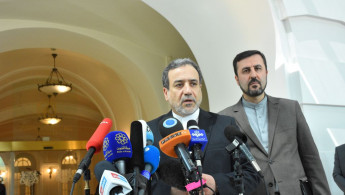Progress made at nuclear talks, but key disagreements remain: Iran negotiator
Efforts in Vienna to restart the nuclear agreement between Iran and Western powers has made progress, although key differences remain between the two sides, Iran’s top negotiator explained on Thursday.
The sixth round of talks began on Saturday and it is hoped that solution will be found to limit Iran’s nuclear activity and lift US sanctions imposed by the previous administration.
“We achieved good, tangible progress on the different issues .... we are closer than ever to an agreement but there are still essential issues under negotiations,” Iranian Deputy Foreign Minister Abbas Araqchi told Al Jazeera television.
Araqchi added that today’s presidential election would have no effect on the talks, which would continue, regardless of domestic policy.
The sanctions imposed by the Trump administration have had a consequential effect on the Iranian economy and talks in Vienna are aimed at ensuring that the sanctions are lifted and do not return.
“We want to make sure that what happened when Trump pulled out of the deal will not be repeated by any other American president in the future,” said Araqchi.
To ensure that sanctions are lifted, the US is demanding strict limits on Iranian nuclear activity.
While Iran expressed satisfaction with the progress of the talks, Russian diplomats in attendance noted that the talks had been tough, but the two side were still not in sync.
“Some difficult and time-consuming topics still remain unresolved,” said Russia's envoy to the talks, Mikhail Ulyanov.
Russia’s comments were mirrored on Wednesday by France’s foreign ministry, who said that significant disagreements remained.
In the US, State Department spokesman Ned Price did recognise the progress that has been made the talks started in April, but also acknowledged the challenges that remain, adding that he did not know how much time was needed to resolve the differences.
“We have made progress between rounds one and six but ... I don’t want to be definitive in embracing one assessment over another,” he said, declining to favour either a Russian or Iranian evaluation of the negotiations.
Iranians will today vote for a new president, with the hardline head of the judiciary, Ebrahim Raisi, widely expected to win.





 Follow the Middle East's top stories in English at The New Arab on Google News
Follow the Middle East's top stories in English at The New Arab on Google News
![The UAE is widely suspected of arming the RSF militia [Getty]](/sites/default/files/styles/image_330x185/public/2024-11/GettyImages-472529908.jpg?h=69f2b9d0&itok=Yauw3YTG)
![Netanyahu furiously denounced the ICC [Getty]](/sites/default/files/styles/image_330x185/public/2024-11/GettyImages-2169352575.jpg?h=199d8c1f&itok=-vRiruf5)
![Both Hamas and the Palestinian Authority welcomed the ICC arrest warrants [Getty]](/sites/default/files/styles/image_330x185/public/2024-11/GettyImages-2178351173.jpg?h=199d8c1f&itok=TV858iVg)